"We come from the land of the ice and snow" -Led Zepplin
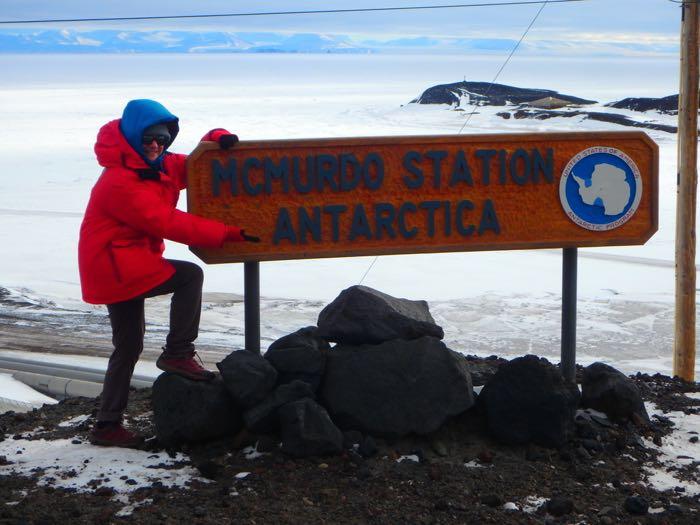 Amy Osborne in front of the sea ice at McMurdo Station, Antarctica
Amy Osborne in front of the sea ice at McMurdo Station, Antarctica
Here I am again, with views from the plane of a sea covered in ice and mountainous land with white snow and ice across most of it. I'm so so excited to be seeing this sight again and even more excited that soon I will be able to walk across this vast snow and ice covered desert. I wonder what it will be like to spend most of my time walking on ice for the next 5 weeks? I wonder how the cold will feel on my fingers, my eyes, my cheeks?
 A view of Antarctica from the C-17 on the way to McMurdo Station
A view of Antarctica from the C-17 on the way to McMurdo Station
 Amy Osborne inside the C-17 happy to finally be headed to Antarctica
Amy Osborne inside the C-17 happy to finally be headed to Antarctica
When we landed on the ice the landing was so surprisingly smooth. There was still the quick stop and the rushing sound of the wings of the airplane bringing us to a halt but it also felt like a glide. Before the door of the plane opened up the back hatch where the cargo was loaded was opened up. I was sitting in the back and could see the sunny blue skies and a land of white out of the hatch. People started piling on their winter gear including their big red parkas.
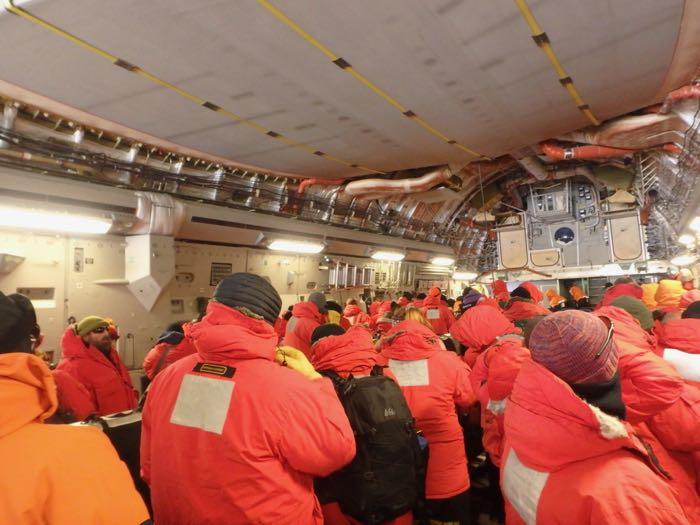 People preparing to get off of the plane once we landed in Antarctica.
People preparing to get off of the plane once we landed in Antarctica.
As I climbed down the stairs of the plane and set foot on the frozen ground I couldn't help smiling from ear to ear. I, again, had the feeling I was in the right place doing the right thing. The bite of cold on my face and feeling of snow under my feet reminded me of my winter at Teton Science Schools living in a cabin in Wyoming teaching kids outside. And this all made me feel so ALIVE!
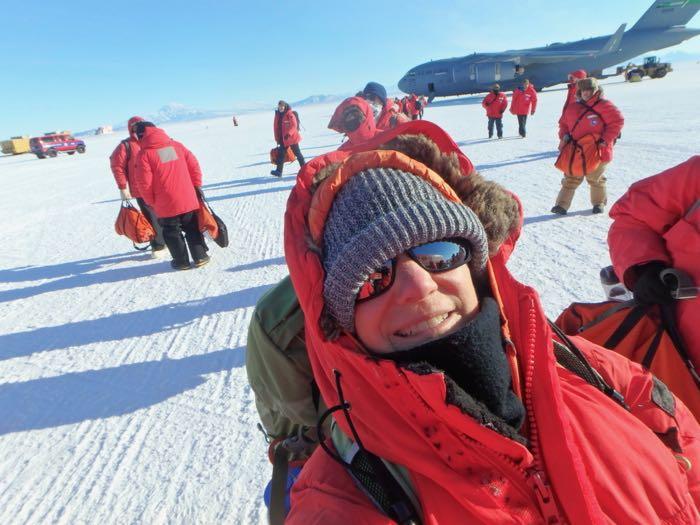 Amy Osborne excited to be on the ice in Antarctica
Amy Osborne excited to be on the ice in Antarctica
I stepped aboard "Ivan the Terra Bus", the slow moving vehicle that would take me from the icy airfield to the small but bustling community at McMurdo station. During the half hour ride to McMurdo I gazed at towering Mt. Erebus, learned about pressure ridges from Maggie, one of the sous chefs, saw the green buildings of New Zealand's, Scott Base, watched as the windmills spun in the shining sun, and felt my heart race as we pulled into McMurdo Station. I made it and I'm so excited to be here!!!
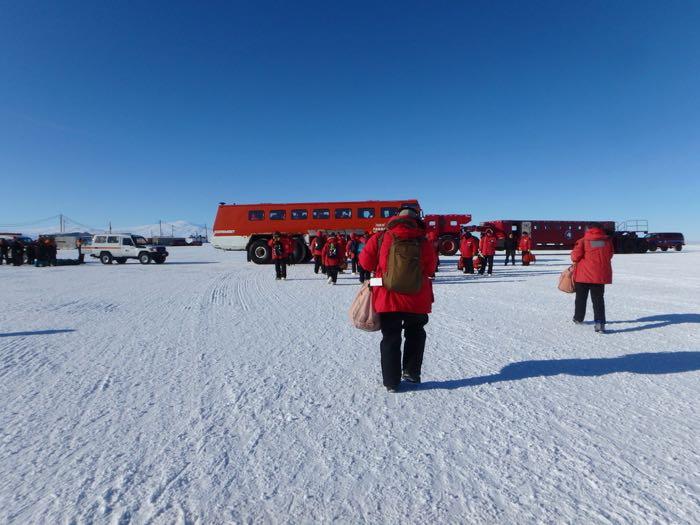 Excited to be on the ice walking to Ivan the Terra Bus, the red shuttle that will take us to McMurdo Station, Antarctica
Excited to be on the ice walking to Ivan the Terra Bus, the red shuttle that will take us to McMurdo Station, Antarctica
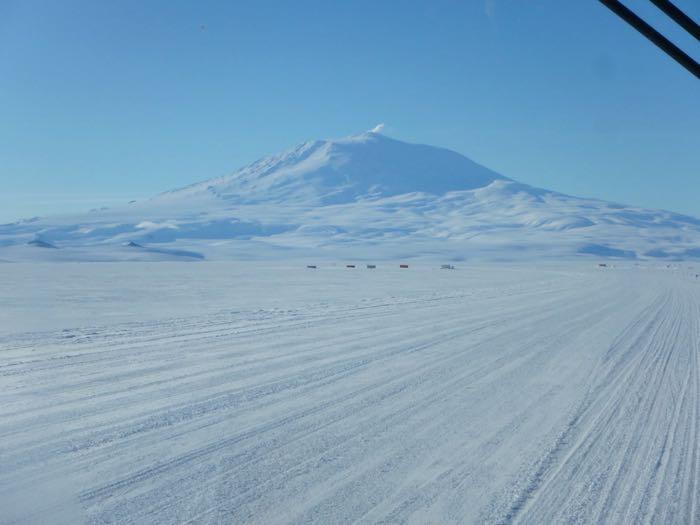 The view of Mt. Erebus on the ride to McMurdo Station
The view of Mt. Erebus on the ride to McMurdo Station
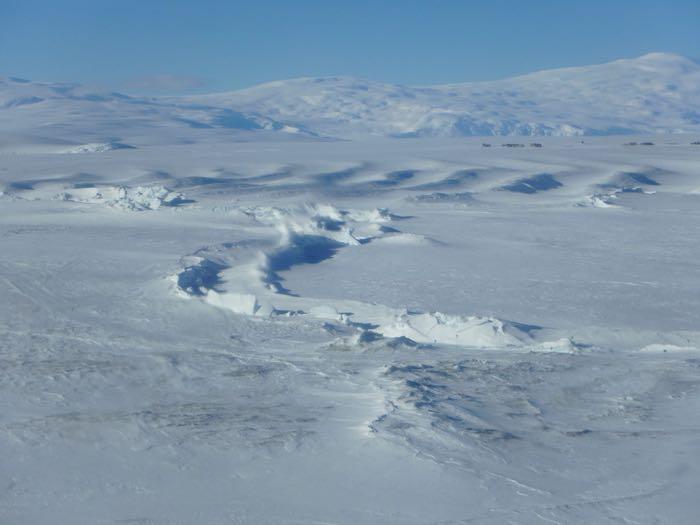 Pressure ridge near New Zealand's Scott Station, Antarctica. A pressure ridge is formed when sea ice collides with the land.
Pressure ridge near New Zealand's Scott Station, Antarctica. A pressure ridge is formed when sea ice collides with the land.
When I arrived at the station I was greeted by Amy and Graham. Amy is the principal investigator who interviewed me and who I'm so excited to have been paired with for this Antarctic expedition. Graham is a graduate student and another member of the research team. We had dinner (Seared tuna noodle bowls...wow! I thought I was going to end up eating pizza the whole time. So far the food here is amazingly yummy and there are a lot of options, including pizza) and they gave me a tour of McMurdo.
 A view from Ivan the Terra Bus of the road into McMurdo Station, Antarctica
A view from Ivan the Terra Bus of the road into McMurdo Station, Antarctica
I had a chance to see my room, which I'll be sharing with Amy. The rooms are set up like a dorm with a long hallway and rooms with two beds on either side. Amy and I each have a bed, 3 drawers, and place to hang our clothes. There's also a desk and a little refrigerator. The most amazing thing about where I am living is that I can go to the end of the hallway and look out the window where I can see where the sea ice meets the land. It is like nothing I have ever seen before and I could just stare out the window forever.
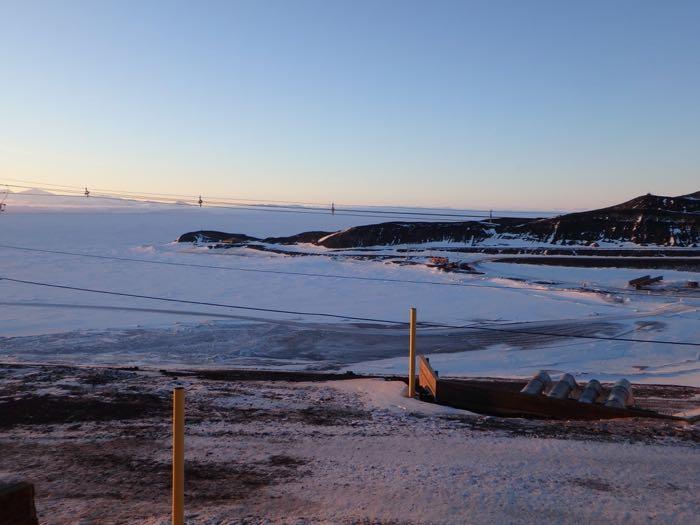 A view out the window of the dorm at 11:30pm, McMurdo Station, Antarctica.
A view out the window of the dorm at 11:30pm, McMurdo Station, Antarctica.
As we walked towards the lab they pointed out the places where people hang out including the gym and the chapel right at the edge. We went into the Crary Lab and I felt like I was stepping into a hall of learning. There are posters on the wall sharing research that has been and is being done on Antarctica, offices and lab spaces line the hallways, and there's even a video screen showing what a camera is filming under the ice. I saw our lab space and then, the most exciting thing happened, I got to meet the marine ectotherms in the aquatic lab! I finally had an opportunity to touch a sea spider and I shook it's thin leg. I'm not sure if that's how sea spiders greet each other but I thought I'd give it a try. I was astounded how friendly the sea spider was. I was really excited to see the nudibranchs in person and meeting them was amazing too. One was right at the top of the tank with it's flowing body waving hello. Below are just a few of my initial photos. Tomorrow I'm hoping for a marine invertebrate photo shoot!
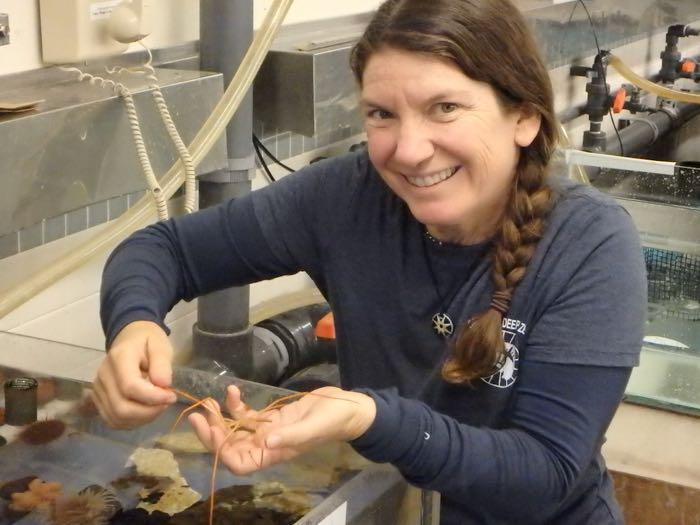 Amy Osborne says hello to a sea spider in the touch tank at Crary Lab, McMurdo Station, Antarctica
Amy Osborne says hello to a sea spider in the touch tank at Crary Lab, McMurdo Station, Antarctica
 A nudibranch in the Crary Aquatic Lab, McMurdo Station, Antarctica
A nudibranch in the Crary Aquatic Lab, McMurdo Station, Antarctica
After our tour I attended a quick welcome orientation while Amy and Graham gathered up my bags for me and took them to my room. Once orientation was over I settled into my room, changed out of my Extreme Cold Weather clothes and then headed over to meet up with the science team for Science Sunday.
SCIENCE SUNDAY
Every Sunday one of the scientists gives a talk about the research they've been conducting. All people at McMurdo are welcome to attend. The room was filled as Heather Liwanag talked about the research she and her team are conducting on Weddell seal pups. The team is studying how the Weddell pups, which don't have blubber or brown fat but do have lanugo fur, stay warm. They are also studying how they develop into amazing divers. I learned a lot about the development of a Weddell seal including that these seals can store 4x more oxygen than humans can and that Weddell seals go from 25% blubber when they are one week old to 38% blubber at 7 weeks old. To learn more about the Weddell seal project- Growing Up On Ice: Early Development of Weddell Seal Pups, check out PolarTREC educator, Bridget Ward's online journals and follow the project at www.icyseals.com
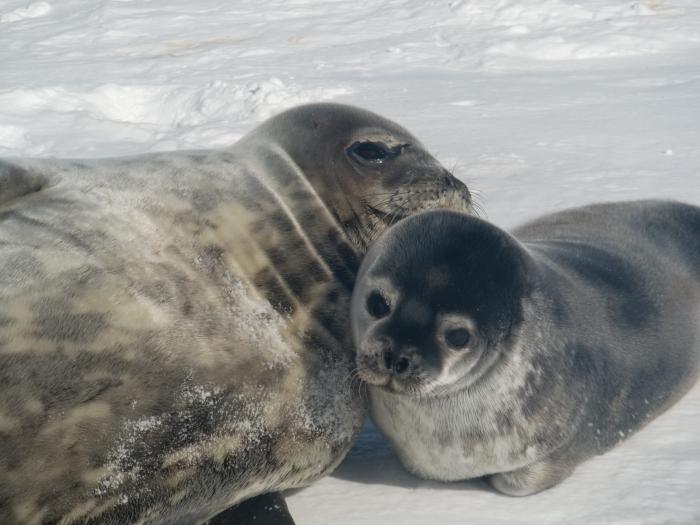 A Weddell seal and pup out on the sea ice near McMurdo Station, Antarctica. Photo by Alex Eilers (PolarTREC 2014), Courtesy of ARCUS
A Weddell seal and pup out on the sea ice near McMurdo Station, Antarctica. Photo by Alex Eilers (PolarTREC 2014), Courtesy of ARCUS
After learning so much about seals I headed back to my room, settled into my dorm and got ready for some sleep. At 11:30pm I glanced out the window at the "sunset" before dozing off to sleep.
As always, feel free to comment and ask questions below. Also, if you are interested in hearing about things in future journals let me know! Coming up...rocks, ice, meet the research team, and training at McMurdo: risk management, survival skills, sea ice, and snow machines!!!
TRIVIA TIME Don't forget, enter your answers to October 18th journal's trivia questions by October 21st at midnight PST for a chance to get a postcard from Antarctica! Stay tuned for another round of trivia!


Comments
Add new comment